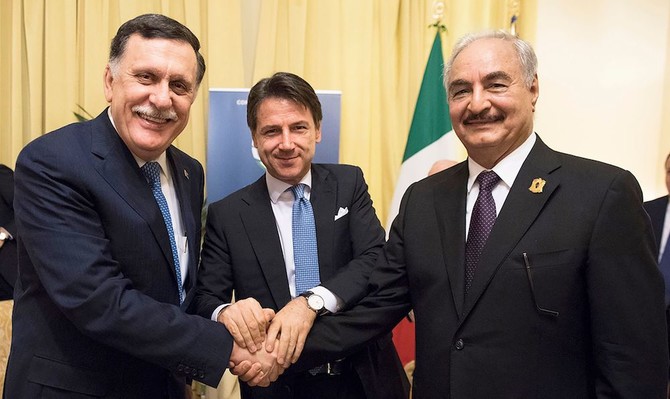PALERMO: Italy’s premier on Tuesday hosted a meeting of Libya's rival leaders on the sidelines of a conference aimed at helping its former colony crack down on extremists and human trafficking.
Photos of the encounter showed Premier Giuseppe Conte presiding over a handshake between the Tripoli-based UN-backed prime minister, Fayez Al-Sarraj, and rival Gen. Khalifa Haftar, commander of the self-styled Libyan National Army that is based in Libya's east.
Later, UN Libyan envoy Ghassan Salame said Haftar, had committed himself to a UN action plan and to holding a national conference early next year prior to elections.
“Haftar is committed to the political process,” Salame told reporters at the end of a reconciliation conference in Italy. “His representatives said that.”
The exclusion of Turkey from the mini-summit prompted the Turks to pull out early, adding drama to the two-day conference at a resort on the picturesque Sicilian seaside.
Other leaders attending the Palermo conference, including French Foreign Minister Jean-Yves Le Drian, and Russian Prime Minister Dmitry Medvedev. The office of Egyptian President Abdel-Fattah El-Sisi, who backs Haftar, confirmed he joined the “mini-summit” Tuesday with Conte and other leaders.
Welcome today’s conference for #Libya in Palermo. Underlined international support for UN Envoy’s Action Plan, including his plans for an inclusive Libyan National Conference which we hope will help create conditions for elections in the course of next year. pic.twitter.com/g5bbaN5LzK
— Alistair Burt (@AlistairBurtUK) November 13, 2018
Italy's populist government organized the two-day conference in hopes of making progress on ending Libya's lawlessness and promoting a UN framework for eventual elections.
But expectations were limited, with Haftar's camp making clear that he wasn't participating in the conference itself but rather meeting with leaders of neighboring countries on the sidelines. Neither Haftar nor El-Sisi posed for the final conference group photo.
And Turkish Vice-President Fuat Oktay pulled out before it ended, citing his exclusion from the morning mini-summit.
“The informal meeting, held this (morning) with a number of players and having them presented as the prominent protagonists of the Mediterranean, is a very misleading and damaging approach which we vehemently oppose,” he told reporters.
“Turkey is leaving the meeting with deep disappointment,” he said.
An Italian diplomatic official, briefing reporters in Palermo, said the atmosphere of the mini-meeting was cordial and collaborative and that Haftar told Sarraj to stay in charge until the elections.
A statement on social media Tuesday by a spokesman for Haftar's army, Ahmed Al-Mesmari, suggested that Haftar was snubbing the broader conference because he accuses representatives from the Tripoli side of working with militias he considers illegitimate, as well as extremists backed by Qatar.
In an interview provided by his media office, Haftar said he wanted to meet with African leaders in particular to discuss migration.
“We are still at war, and the country needs to secure its borders,” Haftar said.
Libya plunged into chaos after the 2011 uprising that ousted and killed longtime dictator Muammar Qaddafi, and it is now governed by rival administrations in the east and west with both relying on the support of militias.
It has also become a haven for Islamic militants and armed groups, including several from neighboring countries, which survive on looting and human trafficking, particularly in the remote south of the country.
Italy's anti-migrant government is keen in particular to stem the Libyan-based migrant smuggling networks that have sent hundreds of thousands of would-be refugees to Europe via Italy in recent years.


























